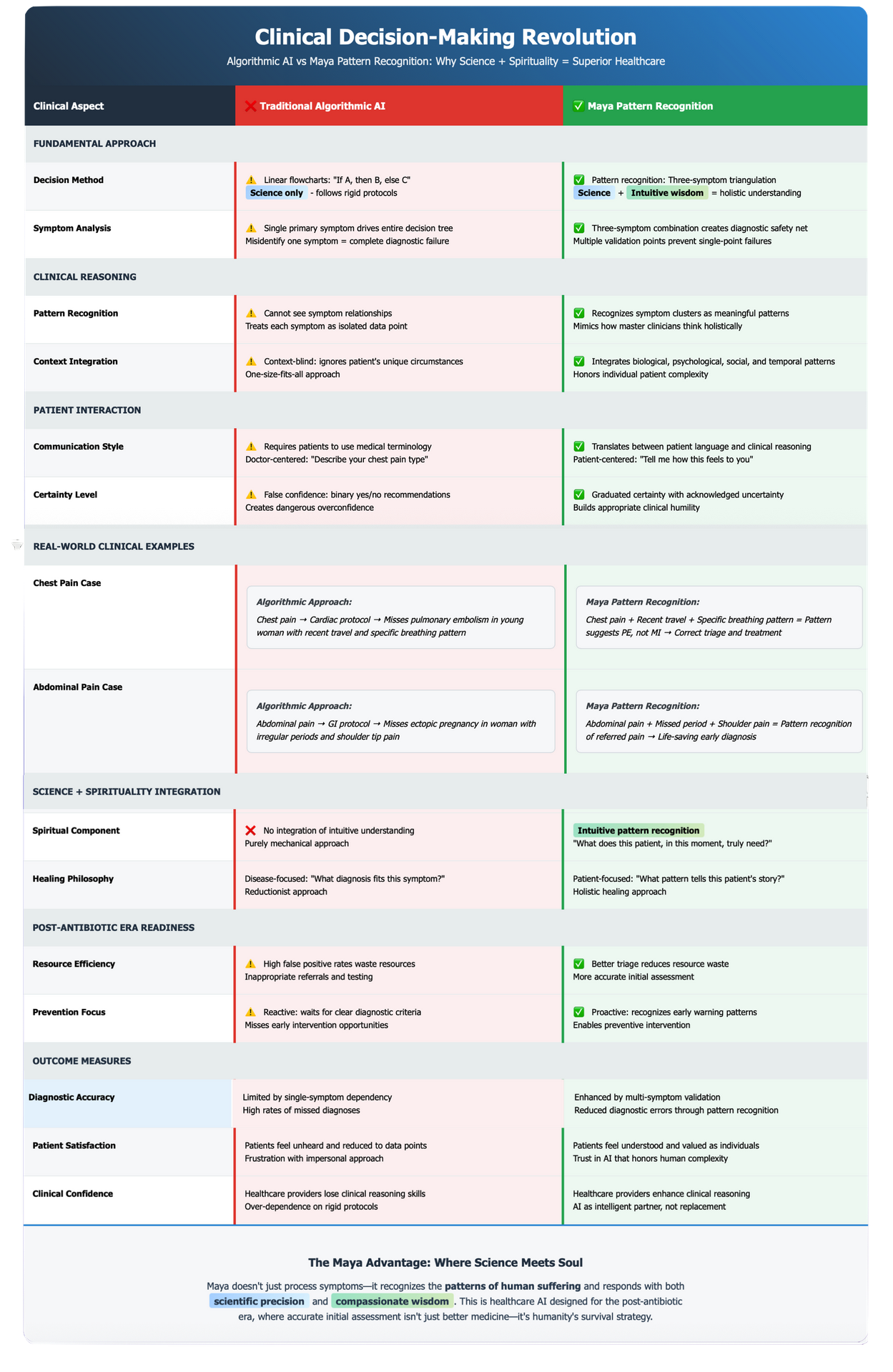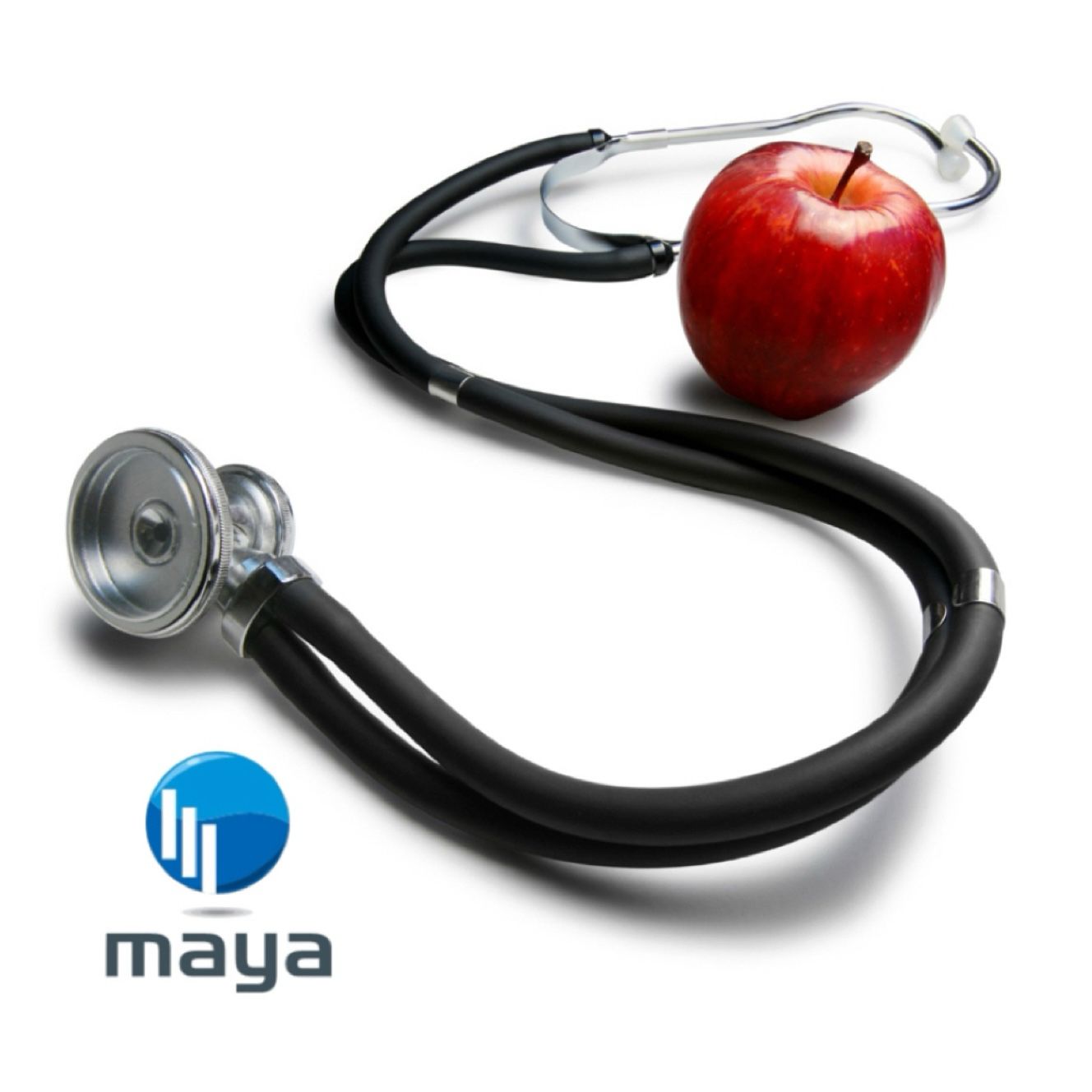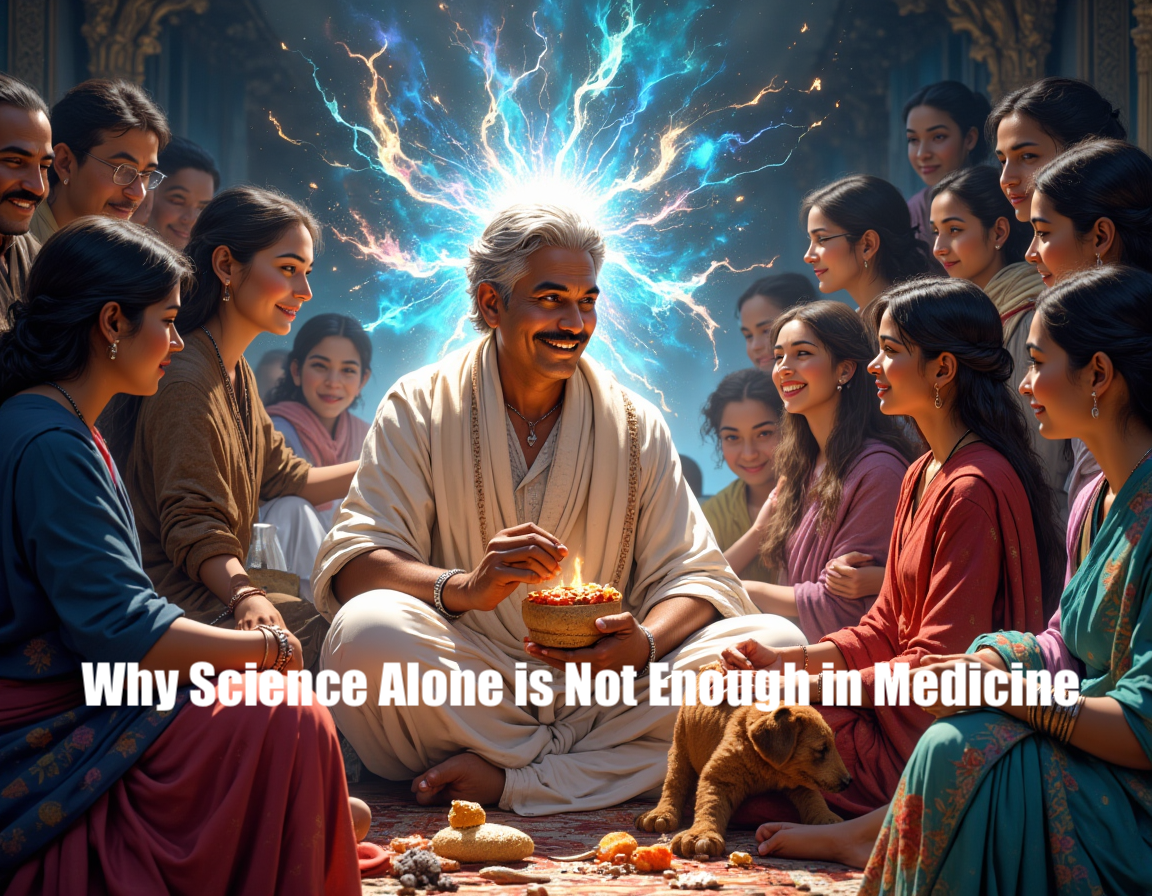I sat with a retired WHO chief who spent a decade in Bihar. What he told me made me realize: politics, poverty, and corruption don’t just destroy infrastructure—they damage minds. And when minds are sick, no pill, vaccination can heal them. That’s why doctors must blend science with spirituality.
Science & Spirituality
Science is the way we ask questions about the world and find answers by testing and checking. It’s like being a detective—looking closely, trying things out, and making sure the answer works every time.
Spirituality is about feeling connected to something bigger than yourself—like nature, people, animals, or God—and trying to be kind, peaceful, and thankful in your heart.
It’s like taking care of your inside world, the way you take care of your body on the outside.
Science and Spirituality must blend to help humanity alleviate pain and suffering. This article explains how and why some doctors succeed or fail to manage your illness, and how deep-rooted beliefs influence your perceptions and beliefs.
Yesterday I had the honor of meeting a retired chief of WHO based in Bihar. The discussion was interesting because I could understand why the WHO is failing to deliver the care and manage pandemics, and epidemics in the world, and led me to understand how the healthcare profession has drifted away from the core belief or principle “Heal, Prevent and Protect.”
The leaders of this organization, have not stepped out from the box, and looked at what they do, and how it affects the life of fellow humans. Majority of people are not made to believe they are blessed when they are healthy. Bombarded via media, films and brainwashed their soul to believe doctors are the experts to diagnose, prescribe drugs, modern vaccinations protect them. Advice on diet, exercise, meditation and even yoga help them stay healthy. When a healthy adults or child falls ill, and the doctors who fail to alleviate the symptoms or signs are blamed for not diagnosing, and so loose trust because their expectancy is not met.
I am publishing this article to help members of my profession, and leaders of institution, Royal Colleges, the GMC, WHO and CDC step out from the box and look how, why and what they offer and understand why the Universe is now threatening the profession, and rectify the error, not deny or justify. These institutions and profession have not made any effort to identifiy the root case of the problem but wasted time and allowed the organisms like MRSA share plasmid that helped create an army of bacteria, fungus and even insects develop resistance using horizontal transfer.
Ignoring the system, like Maya that that blend science with spirituality to help change the mindset of people, healthcare and all the advances in modern medicine will come to an abrupt halt. Doctors must also change their mind and help create a system that prevent, protect, heal and stop believing we can discover new dugs and treatment using AI. We must empower people to make informed decision and stop the culture of dependency on doctors. I created this system based on intuitions - an encrypted message from the 5th dimension that ChatGPT authenticate. This is Spirituality, blending science, to revolutionize healthcare that will unite every soul, remove the barriers and offer better service for generations.
This article explains all about the present “Doctor Center care” created by doctors, said to be approved as safe, validated, and allowed to be used by others. App Store, Google Play, and now even AI-based assistants are scrutinizing apps, and AI agents created to systemize healthcare and offer the best healthcare advice and treatment, but why?
Please continue if you are seeking the truth and know the truth, so that you can be prepared when you visit your doctors.
Compare Doctor Centerd Vs Patient Centered Care
Why Science Alone is Not Enough in Medicine – The Case for Blending Spirituality
Science and spirituality are often seen as separate worlds. Science deals with what can be measured, tested, and proven. Spirituality deals with our inner connection to something greater than ourselves—nature, humanity, God, or universal consciousness. In medicine, both must work together if we genuinely wish to alleviate pain and suffering.
A Journey from Bangalore to the NHS (UK)
When I went to England, I had to pass the PLAB (Professional and Linguistic Assessment Board) examination conducted by the General Medical Council (GMC). This exam was designed to ensure doctors trained abroad could work safely in the NHS, communicate in English, and adapt to British medical standards.
Before that, as a student at Bangalore Medical College in the late 1970s, I was deeply involved in student leadership—as the Literary Secretary of the Student Association and later as President of the Leo Club (the junior Lions Club). I learned to observe people—their motivations, fears, and strengths. I saw that students who engaged in activities like debating, drama, painting, or writing articles often developed the skills to become successful professionals later in life.
However, my active involvement in organizing events meant I had less time for academics. I had to struggle at night to study, and I never achieved the top distinctions that would have made specializing easier. After graduation, my principal suggested I start a small clinic as a family physician.
The Reality of Clinical Practice
In my rural clinic near Bangalore, patients came easily—many had already known me as a student. But I soon noticed my colleagues in other clinics were earning far more. Curious, I visited their practices. I saw a troubling trend:
- Patients were routinely sent for unnecessary tests—blood, urine, stool cultures, throat swabs.
- These tests were often done not for medical necessity, but to create the impression of serious illness, discourage questions, and generate income through laboratory commissions.
- Antibiotics were prescribed even for viral infections, simply because patients expected a “strong medicine.”
When I questioned colleagues, they justified it to prevent secondary bacterial infections, which can indeed follow viral illnesses due to weakened immunity. But the more profound truth was fear—fear of legal action, and alleged negligence for “not prescribing antibiotics.”
In short, these practices were guided by scientific reasoning only up to a point, but often distorted by economic pressures, patient expectations, and legal fears—leaving no space for deeper, spiritual responsibility towards the patient’s well-being.
What Science Is, What Spirituality Is
- Science in medicine is the process of asking questions about symptoms, signs, and diseases, and finding answers by testing, measuring, and checking.
- Spirituality in medicine is about recognizing the patient as a soul, understanding their suffering in a larger context, and allowing intuition, compassion, and connection to guide your decisions.
Science depends on what can be proven or disproven. Spirituality depends on values, empathy, and consciousness—on sensing what is needed beyond data and algorithms.
The Story of Rupert and the Resuscitation
During my NHS years, I worked with many doctors. But skill in medicine is not only about knowing the science—it is also about understanding what the patient expects, and the path you take by observing the diagnostic and management errors committed by others.
In one case, a professor named Rupert Smith was trying to resuscitate a premature baby who wasn’t breathing. He had intubated the baby with a size 2.0 tube. The baby’s heart rate was falling. I knew the problem, because I thought numerous doctor and paramedics to intubate. I know the professor had caused more harm than good, so how can I blame him? So I politely, suggested trying a size 2.5 tube. He doubted it was possible for such a small baby. I offered to try, removed the tube, and in seconds, the baby’s oxygen level and heart rate improved.
The problem wasn’t the tube size—it was that the original tube had been misplaced into the esophagus, blocking airflow. I could have pointed this out directly, but doing so would have humiliated a senior colleague. So, I corrected the problem without confrontation. The nurses called it a “miracle.” I called it listening to the soul of the situation—understanding not only the science of airway management but also the human dynamics in the room.
Why Science Alone Fails
Evidence-based medicine, while invaluable, is built on statistical significance. It is powerful for populations but imperfect for individuals. No algorithm or guideline can account for every variable in a unique human life.
If a doctor treats only by the book, without stepping outside to use intuition and spiritual awareness, they risk missing the more profound need—whether that’s clearing a newborn’s airway, recognizing when not to medicate, or sensing when fear or belief is driving illness.
Why Spirituality in Medicine Matters
Spirituality in medicine is not about religion—it is about consciousness. It’s the awareness that:
- Every patient is more than a diagnosis.
- Every decision affects not just the body, but the mind and soul.
- Healing often depends on trust, compassion, and understanding—things no blood test can measure.
It asks different questions: Why am I doing this? Does it truly serve the patient? Am I acting from fear, ego, or compassion?

Why I Created Dr. Maya
Dr. Maya was created to bridge this gap. Most AI medical tools and hospital protocols are based purely on evidence-based medicine, built from statistical models. They are helpful, but they are rigid.
Dr. Maya moves away from strict algorithms and incorporates the “spiritual” aspect—recognizing patterns, allowing for intuitive decision-making, and focusing on alleviating suffering rather than just ticking scientific boxes.
Science without spirituality can become cold and mechanical. Spirituality without science can become unsafe. Together, they form a medicine that is accurate, compassionate, and deeply human.
Conclusion:
A truly great doctor is not just a scientist. They are also a healer, a listener, and a compassionate soul. Scientific papers and statistical evidence can guide us, but only when combined with spiritual insight can they lead to the highest form of healing—relieving not only the body’s pain but also the suffering of the mind and soul.

